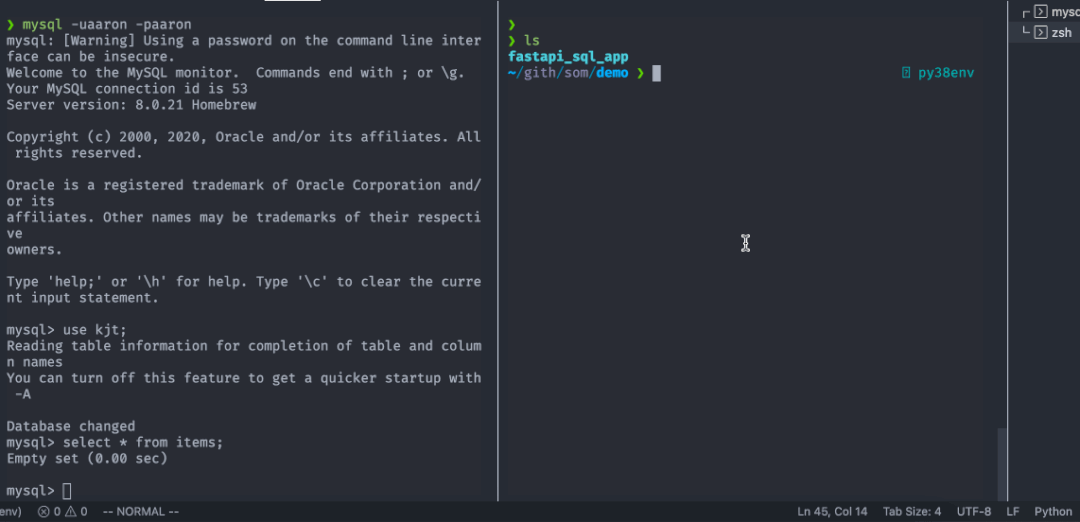FastAPI 之自動化測試數(shù)據(jù)庫接口
今天的文章分享如下在 FastAPI 框架下,使用 pytest 來自動化測試數(shù)據(jù)庫相關的接口,文章的最后給出全部代碼。
最近越來越喜歡使用 FastAPI 來寫后端服務了,因為它是 Python 領域性能最好的 Web 框架,它專注于提供高性能的 Web API,其他方面并不限制你的手腳,可以隨意使用你喜歡的三方庫,這點類似于 Flask,可以量身定制你的后端架構(gòu),以滿足自己的需求。
需要說明的是,后端服務基本是離不開關系型數(shù)據(jù)庫的,我之前是使用 Django,Django 的 ORM 太優(yōu)秀了,以至于我從 Django 轉(zhuǎn) FastAPI 有點很不適應。在 ORM 領域,可以說除了 Django 的 ORM,就是 SQLAlchemy 了。所以不用 Django,就必須會用 SQLAlchemy,要快速了解,看看廖雪峰的官方網(wǎng)站的使用 SQLAlchemy[1] 來快速入門。
FastAPI 涉及數(shù)據(jù)庫的接口寫起來并不難,跟著官方文檔sql_databases[2],5 分鐘,我們就可以生成關于數(shù)據(jù)庫的增刪改查的 Restful 風格的 API,難的是如何自動化的測試,
通常情況下,我們會使用 pytest 進行自動化單元測試,根據(jù)數(shù)據(jù)庫的記錄數(shù)來斷言,但是,每測試一次,數(shù)據(jù)庫中的記錄就保存了下來,你下次測試時如果不手動清理,那測試仍然可能失敗。
那怎么解決呢?
那就是利用數(shù)據(jù)庫的回滾功能,會改變數(shù)據(jù)庫記錄的接口測試完成后讓事務回滾,這樣每次測試完成后,數(shù)據(jù)庫的記錄數(shù)是不變的,每次運行 pytest,數(shù)據(jù)庫的記錄數(shù)是不變的,這樣就可以進行自動化測試。
要想實現(xiàn)這一點,我們需要借助于 pytest 的 fixture 功能。
pytest.fixture 是一個裝飾器,用于聲明函數(shù)是一個 fixture。如果測試函數(shù)的參數(shù)列表中包含 fixture 名,那么 pytest 會檢測到,并在測試函數(shù)運行之前執(zhí)行 fixture。
比如:
- import pytest
- @pytest.fixture()
- def some_data():
- return 42
- def test_some_data(some_data):
- assert some_data==42
fixture 包含一個 scope 的可選參數(shù),用于控制 fixture 執(zhí)行配置和銷毀邏輯的頻率:
- scope='function' 函數(shù)級別的 fixture 每個測試函數(shù)只運行一次。配置代碼在測試用例運行之前運行,銷毀代碼在測試用例運行之后執(zhí)行。function 是 fixture 參數(shù)的默認值。
- scope='class' 類級別的 fixture 每個測試類只運行一次,不管測試類中有多少個類方法都可以共享這個 fixture
- scope='module' 模塊級別的 fixture 每個模塊只運行一次,不管模塊里有多少個測試函數(shù),類方法或其他 fixture 都可以共享這個fixture
- scope='session' 會話級別的 fixture 每次會話只運行一次。一次 pytest 會話中的所有測試函數(shù)、方法都可以共享這個 fixture
比如說讓數(shù)據(jù)庫回滾的,我們就可以寫一個這樣的 fixture:
- @pytest.fixture(scope="function")
- def db(db_engine):
- connection = db_engine.connect()
- # begin a non-ORM transaction
- connection.begin()
- # bind an individual Session to the connection
- db = Session(bind=connection)
- # db = Session(db_engine)
- app.dependency_overrides[get_db] = lambda: db
- yield db
- db.rollback()
- connection.close()
當然還有很多 fixture,比如說創(chuàng)建數(shù)據(jù)庫引擎:
- @pytest.fixture(scope="session")
- def db_engine():
- engine = create_engine(SQLALCHEMY_DATABASE_URL)
- if not database_exists:
- create_database(engine.url)
- Base.metadata.create_all(bind=engine)
- yield engine
再比如,在測試前,數(shù)據(jù)庫中先插入 2 條數(shù)據(jù):
- @pytest.fixture
- def items(db):
- create_item(db, schemas.ItemCreate(title="item 1"))
- create_item(db, schemas.ItemCreate(title="item 2"))
把這些 fixture 函數(shù)放在文件名conftest.py 中,pytest 會自動讀取并執(zhí)行。至于為什么放在 conftest.py中,請查閱 pytest 文檔,這里不展開,
接下來,利用這些 fixture,編寫單元測試用例,一個示例如下:
- from fastapi.testclient import TestClient
- from . import crud
- from .main import app
- def test_post_items(db):
- client = TestClient(app)
- client.post("/items/", json={"title": "Item 1"})
- client.post("/items/", json={"title": "Item 2"})
- client.post("/items/", json={"title": "Item 3"})
- items = crud.get_items(db)
- assert len(items) == 3
- def test_list_items(items, client):
- response = client.get("/items")
- assert len(response.json()) == 2
其中 test_post_items,測試的是提交了 3 個數(shù)據(jù),然后斷言數(shù)據(jù)庫中的記錄數(shù)為 3。test_list_items 有個參數(shù)是 items,會調(diào)用之前的 fixture,提前往數(shù)據(jù)庫插入了 2 條記錄,因此斷言記錄數(shù)為 2。
每個測試函數(shù)執(zhí)行時互不影響,執(zhí)行完成后,數(shù)據(jù)庫都會回滾,測試前 items 是空的,測試之后 表仍然是空的,這樣就可以自動進行數(shù)據(jù)庫的測試了。
完整代碼
不能選擇 sqlite 數(shù)據(jù)庫進行測試,因為它不支持并發(fā)訪問。
代碼的數(shù)據(jù)庫配置為 mysql,用戶名、密碼、數(shù)據(jù)庫名請自行修改后執(zhí)行。

































